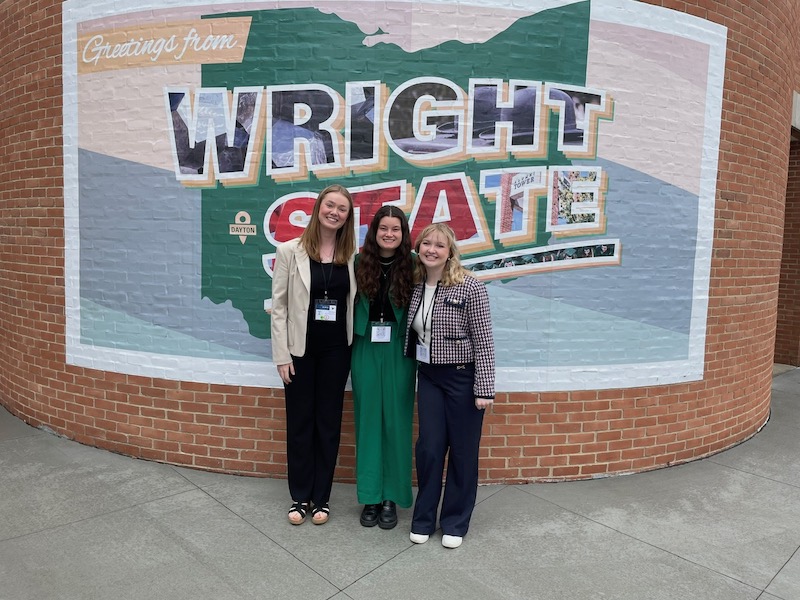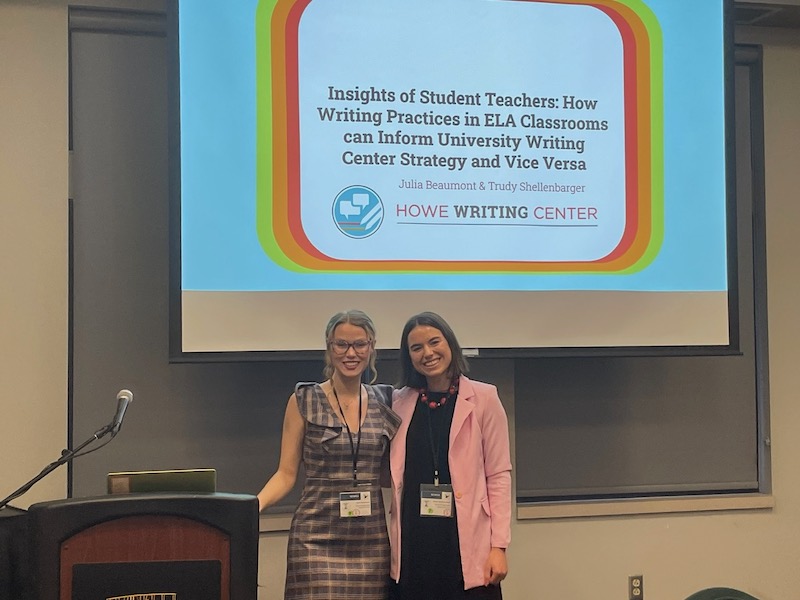Eight Howe Consultants Present Original Research at Wright State
Early this March, the Howe Writing Center sent eight writing consultants to present original research at the annual East Central Writing Center Association Conference, held this year at Wright State University. Accompanied by Howe Writing Center director Lizzie Hutton and manager Kate Francis, the consultants shared their work with colleagues from across the midwest, leading and attending three days worth of presentations, roundtables and workshops.
Eight Howe Consultants Present Original Research at Wright State
Early this March, the Howe Writing Center sent eight writing consultants to present original research at the annual East Central Writing Center Association Conference, held this year at Wright State University. Accompanied by Howe Writing Center director Lizzie Hutton and manager Kate Francis, the consultants shared their work with colleagues from across the midwest, leading and attending three days worth of presentations, roundtables and workshops.
Undergraduates Cole Pittman and Ally Britton-Heitz found the conference keynote on AI in the writing center especially compelling. Another highlight for consultants was the opportunity to support and feel so supported by writing center peers, both from Miami and further afield. As undergraduate Kylie Mullis explained, “I truly enjoyed having the opportunity to listen to consultants, faculty, and staff discuss ways to utilize the writing center beyond its traditional capacities.” Undergraduate Julia Beaumont concurred: “it was an enlightening experience to hear about other writing centers’ best practices and new ideas.”

Consultants Kylie, Ally, and Meredith pictured outside Wright State, where ECWCA was held.
All presentations emerged from ongoing original research projects undertaken by HWC consultants and mentored by HWC staff. Undergraduates Trudy Shellenberger and Julia Beauchamp’s presentation drew from their experiences as both pre-service student teachers and writing center consultants to argue for more dialogue between K-12 ELA educators and writing enter practitioners. During their Q and A, they inspired a lively discussion among audience members about how these two fields can better inform each other.
Undergraduates Meredith Perkins, Kylie Mullis and Ally Britton-Heitz presented the results from their study comparing AI-generated feedback and consultant-generated feedback that responded to the same sample student paper. While they found that the feedback generated by ChatGPT shared some elements with that composed by a human consultant, these researchers also found consultant-generated feedback offered writers far more specific and actionable suggestions.
Undergraduate Meredith Perkins additionally ran a workshop in which she outlined a vision for how writing centers can transform themselves into spaces for community advocacy. A regular contributor to the Miami Student, Meredith then led audience members through the collaborative op-ed writing workshop she had helped organize at the HCWE last fall, showing how writing center consultants and administrators could reproduce these events on their own campuses.
Undergraduate Cole Pittman introduced research on the professional skills that students develop through their work as peer writing consultants. Drawing on interviews with eight writing center consultants, Cole showed how consultants saw themselves not only improving their communication and interpersonal skills, but their time management skills, problem solving skills, and confidence overcoming social barriers.
Two English department graduate students also presented original research. HWC Graduate Assistant Director Claire Metzger presented preliminary findings from her masters thesis research on required visits to the writing center. Graduate consultant Matt Farley joined with HWC manager Kate Francis to share their plans for using technology to make HWC outreach more inclusive.

Consultants Julia and Trudy pictured in front of their presentation
A core strength of the Howe Writing Center is its focus on student research, and its commitment to supporting research with implications not only for our own writing center practices and policies but for the practices and policies of other writing centers. Whether through their workshops on writing center outreach and community advocacy, or their investigations of AI and of the specific skills and knowledge that consultants bring to their work with student writers, HWC consultants provided their colleagues in the field substantive food for thought. Consultants also returned back to their home writing center with a new understanding of what writing centers can make possible, both for the consultants who work there and the writers they support.